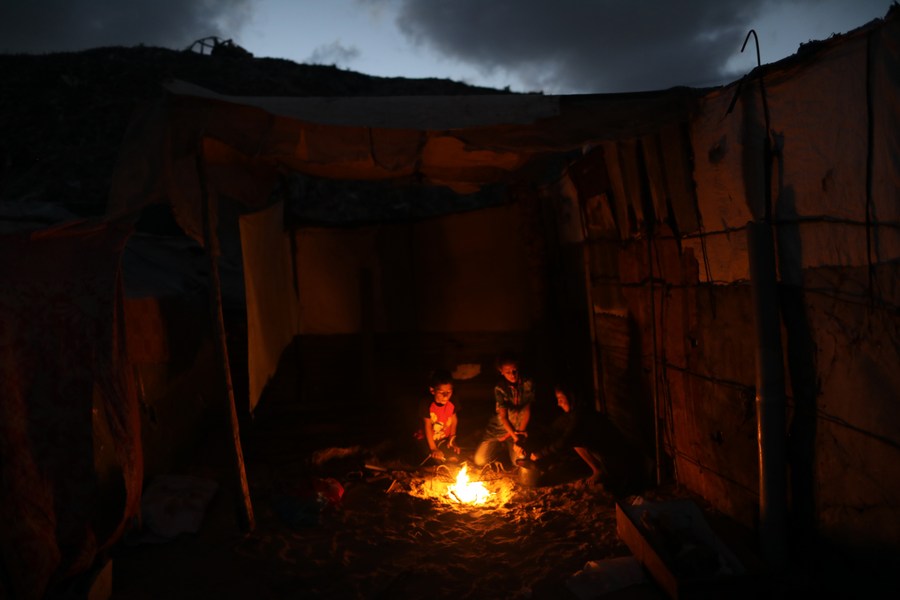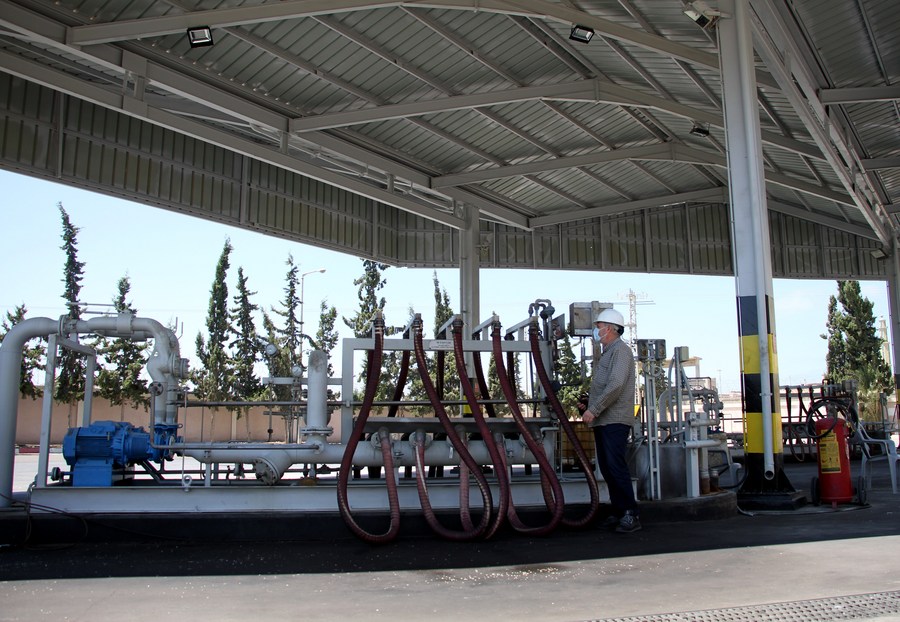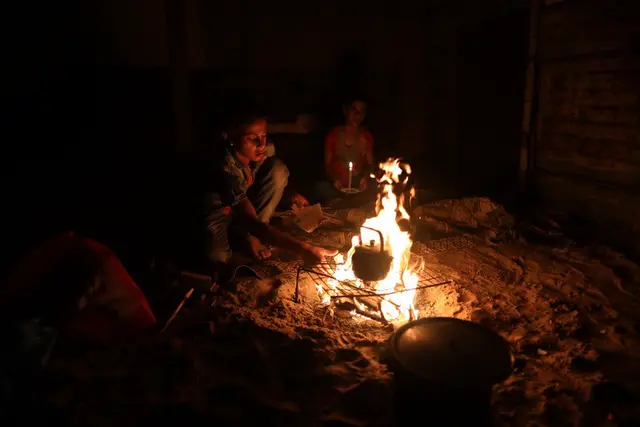Palestinians sit in front of a fire outside their house during a power outage in the southern Gaza Strip city of Khan Younis, on Aug. 18, 2020.(Photo by Yasser Qudih/Xinhua)
Palestinian children sit in front of fire at dark amid a power outage crisis in the Gaza Stripafter the only power plant in the enclave has completely stopped operation over a fuel shortage.
by Sanaa Kamal
RAMALLAH, Aug. 19 (Xinhua) -- Officials stepped up their warning about the dangerous consequences of the power outage crisis in the Gaza Strip after the only power plant in the enclave has completely stopped operation over a fuel shortage.
On Tuesday, Muhammad Thabet, director of public relations in Gaza Electricity Distribution Company, told Xinhua that all the four turbines of the power station have turned off as a result of Israel's decision to ban the fuel shipment to Gaza through the Kerem Shalom commercial crossing point between southern Gaza and Israel.
He added that the decision to turn off the turbines forced the company to adopt an electricity distribution schedule that limits the supply of electricity to three or four hours per day, which will inevitably cripple all aspects of life in the enclave.

Palestinians sit around a fire during a power outage outside their house in the southern Gaza Strip city of Khan Younis, on Aug. 18, 2020. (Photo by Yasser Qudih/Xinhua)
In a press statement, the International Committee of the Red Cross, warned that the electricity schedule "will increase the burdens on the fragile health sector in the coastal enclave."
"It will be difficult for Gaza's residents to obtain water and the environmental problems will continue to rise as a result of Israel's decision," it added.
Gaza Health Ministry's Spokesman Ashraf al-Qedra also warned of catastrophic consequences on patients' lives because of the long hours of the power outage in the local hospitals.
"It will also have a serious impact on children in nurseries, patients in intensive care, and those who are undergoing surgeries," he added.

A Palestinian nurse looks after a premature newborn baby at al-Shifa Hospital in Gaza City, on Aug. 18, 2020. Officials in the municipalities in the Gaza Strip and the health ministry warned of the complete closedown of the power station. They said that it would be disastrous on the health situation as well as the environment.(Photo by Rizek Abdeljawad/Xinhua)
In a press statement, Gaza Municipalities Union warned that the municipalities would not be able to provide residents with essential services, including the delivery of water and the pumping of wastewater into sewage treatment plants, which could lead to "a health and environmental disaster."
To overcome the new crisis, the municipalities said they might be forced to pump sewage water directly towards the sea without any treatment, or they might choose to disrupt the collection and treatment of solid waste.
Therefore, they called on the responsible local authorities to provide the necessary electricity to operate the municipal facilities and stations.

A Palestinian worker is seen at a power plant in central Gaza Strip, on Aug. 17, 2020. Palestinian Energy and Natural Resources Authority (PNERA) on Aug. 16 warned that Gaza Strip's only power plant would run out of fuel by Tuesday after Israel shut down the border crossing last week. (Photo by Rizek Abdeljawad/Xinhua)
The Gaza Strip, which is home to more than 2 million people, needs some 500 megawatts of electricity everyday. But the power station generates only 120 megawatts and Egypt and Israel supply Gaza with 30 megawatts and 120 megawatts respectively.
Israel closed the Kerem Shalom commercial crossing with Gaza last week, except for entry of humanitarian aid, in response to the launching of incendiary balloons from the coastal enclave into southern Israel.
As a result, Ali al-Hayek, chairman of Gaza Businessman Association, warned of an "economic disaster" because of the suspension of dozens of construction and food factories in Gaza amid the worsening power outage.
In a press release, al-Hayek called on the international community and humanitarian organizations to pressure Israel into letting fuel into Gaza.
Sami al-Amassi, president of the General Federation of the Palestinian Trade Union, said that turning off the only power plant in Gaza threatened to put an end to 90 percent of the local factories, which will lead to the unemployment of nearly 50,000 Palestinian workers.
He added that the production of about 500 factories will shrink to 20 percent of its production capacity, which will negatively affect the production cycle.
Al-Amassi pointed out that the continued Israeli blockade of the coastal enclave since mid-2007 has led to an increase in the rate of unemployment and the spread of poverty among the people in Gaza.
 简体中文
简体中文



